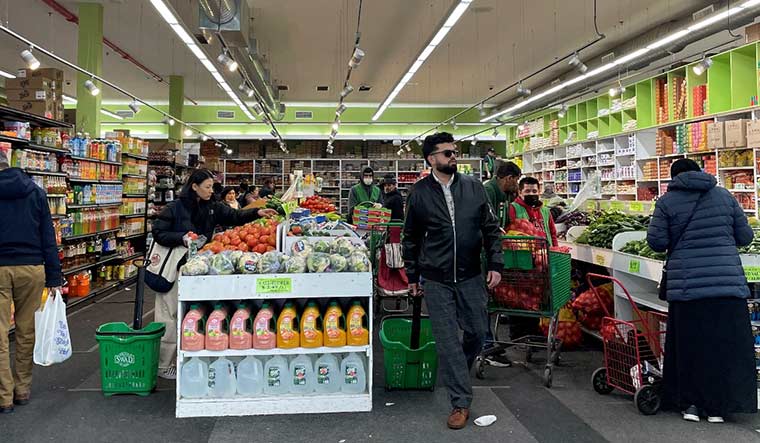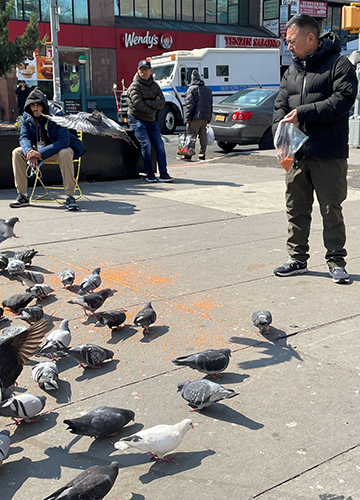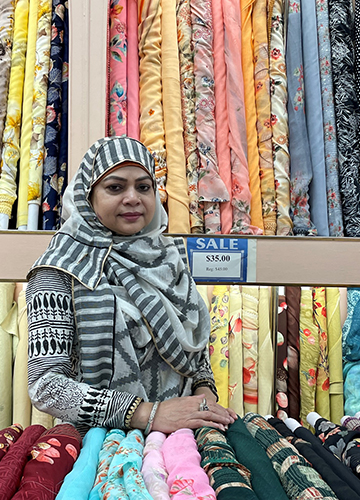How can one understand what motivates South Asian Americans to vote, or not to vote? I tracked the species in their natural habitat—the temples, storefronts, and the chai and dosa eateries of Queens, in New York City.
Jackson Heights, called Jaikishan Heights affectionately by desis, is the mother of all South Asian neighbourhoods, a melting pot of many different cultures. They may be cultures which often bicker in Asia, but on these streets, you find signposts which tout Indian, Pakistani and Bangladeshi groceries all in one store; you have Bangladeshi, Chinese and Thai cuisine, all in one restaurant. Another ambitious eatery promotes Nepali, Bangla and Indo-Chinese food on its signboard.
The worshipers who stream into the Satyanarayan Hindu Temple on Woodside Avenue are from many diverse towns and communities in India, Nepal, Bhutan and the Caribbean islands. They share the same gods and gather together on the temple’s carpeted floor to chant the holy bhajans. They also share many of the same foods—the spicy samosa and the sugary sweet gulab jamun are loved by all these communities.
Yet, when it comes to politics and the upcoming elections, they have widely differing opinions and feelings. Having come from countries where politics is often regarded as a dirty game, many are indifferent to it or just plain apathetic, believing their participation will have no real impact on the outcome. Others, who have lived here longer, know that there is strength in numbers and their vote can make a difference.
Meena Kashyap, who is from India, has seen this community up close. “Ever since I became a citizen, I have always voted,” she said. “After my retirement, I often work for the election commission. During elections, we tell them where to go to vote, and how to register themselves. Voting in the local elections is even more important because when you put the right people locally, you are sure whatever is happening on top is trickling down. The right people are there to see that everything works.”
Kashyap, whom I have known for many years, accompanied me on this informal reportage mission. We ate plates of spicy chaat and aloo tikki and had enormous glasses of mango lassi. We talked to servers and staff. We then moved on to sari shops, beauty parlours, boutiques and mithai stores. Everywhere, people were polite and friendly—and reluctant to disclose too much about their voting patterns. At a beauty parlour, they were happy to chat, but not on camera. Unlike the youthful Instagram generation, they were uncomfortable about their names and photos being published.
As a reporter, it was awkward not to be able to record people’s names or photos, until I realised that, that I was part of the story. One of the reasons for their reticence is that many of them are newcomers, not entitled to vote. We had stumbled into a surreal world, down a strange rabbit hole of both new immigrants and people who had been here for years—but were still mired in their quest for papers. Many of them would make ideal citizens, but were not there yet.
As one young, earnest Nepali worker explained, he would love to vote, but his papers were still in submission stage. I got the same reaction from a few Bangladeshi workers at fast food carts. Indeed, the audacious possibility of American citizenship is what had brought many to this country and many were still in limbo, waiting to accomplish that. The manager at a supermarket observed that once people became citizens, they generally would be able to go for better paying jobs and would not remain blue-collar workers in an ethnic neighbourhood.
At a longstanding popular sari store on 74th Street, the tenor was a little different. In the calmer environment, the owner, who is Indian American, told me that he always voted, but was a New Jersey resident. His manager said he did not always vote because of time constraints, but his daughters always voted. It was, however, the Bangladeshi female staff, who were most enthusiastic about talking about their voting experience. Samiha Chowdhury, who spends her days showing saris and kurta pieces to clients, has worked in the store since 1997. She said that she had voted for the past 28 years. Her whole family used to vote in Bangladesh and she has carried on that tradition here.
Keya Khadija, also from Bangladesh, has been here just one year and her papers are being processed. She is here with her husband and children and recalls they always voted in Bangladesh. She said, “The Bangladeshi community is very active in voting and I will also vote because there is inflation and also unemployment.”
The South Asian community is not a monolith. And it is made up of many different people who respond in different ways. There are many who are born here, who have been educated here or have been living here for years. For them, voting is commonplace and their story differs from that of the people who are just getting their bearings and who are still part of the ‘strugglers club’. Perhaps to make a stronger voting community, these voiceless people need to be nurtured and given training in what makes good citizens.
Sudha Acharya is the founder and executive director of South Asian Council for Social Services (SACSS), whose mission is to empower and integrate underserved South Asians into the civic life of Queens. “We have citizens, we have green card holders and we also have people who have no papers at all,” she said.
The organisation has a multi-armed approach to the community. There is a food bank, legal clinic, civic engagement, health clinics, workforce development and language access. “We connect them to benefits like health insurance and food stamps and make services available to them. We also make them aware of their civic responsibility and how they are part of the whole political structure. We encourage them to vote.”
During elections, SACSS volunteers do phone banking to hundreds of thousands in the community. Said Acharya, “I think there should be support for this population that is culturally sensitive and language-based. I would support any candidate who is for these things, for diversity.”
An organisation which is involved with GOTV (Get Out the Vote) efforts is Adhikaar, a human rights and social justice group, based in Jackson Heights. It is a women-led group, and its policy manager Tsering Lama gave an optimistic picture of the civic health of the South Asian voter community: “There is definitely a big South Asian population that is voting. We specifically work with a Nepali speaking community from countries like Nepal, India, Bhutan, Tibet and Burma. Since our communities are newer, we want to make sure that our members vote and have access to the voting information.”
Adhikaar gives those who are not yet eligible to vote the right tools to become future good citizens. “Civic engagement for us is not just through the narrow lens of people who can or cannot vote,” said Lama. “It is really about being able to be in this country and being able to be civically engaged. And that can be through any form of advocacy and being involved in campaigns and to really better their own lives.”
Lavina Melwani is a New York-based journalist who writes for several international magazines. She blogs at Lassi with Lavina.




